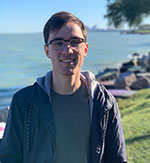A Window Into Artificial Intelligence
Lukas Justen (MSAI ‘20) is using artificial intelligence to help transform how glass is manufactured, leaving an impact on everything from stove tops to outer space.
Most people think of glass merely as something between them and the outside world – if they think about it at all.
Not Lukas Justen (MSAI ‘20).
To Justen, the glass he helps produce is a finely crafted piece of technology – something vital between a pilot and the jet stream, the eyes of a soldier and a target illuminated through night vision goggles, or the gaze of an astronomer and a far-away galaxy.
 Justen is a senior software developer for SCHOTT AG, a Germany-based global corporation, founded in 1884, with production and sales units in 34 countries and over 16,500 employees. It is one of the leading specialty glass companies in the world. SCHOTT manufactures specialized glass and glass ceramics used in anything ranging from cockpits to cars, and satellites to vaccine vials. Its glazing and shielding technology creates glass that protects against X-rays and gamma rays, yet SCHOTT also produces warm, welcoming, stylish components for high-end interior decorating.
Justen is a senior software developer for SCHOTT AG, a Germany-based global corporation, founded in 1884, with production and sales units in 34 countries and over 16,500 employees. It is one of the leading specialty glass companies in the world. SCHOTT manufactures specialized glass and glass ceramics used in anything ranging from cockpits to cars, and satellites to vaccine vials. Its glazing and shielding technology creates glass that protects against X-rays and gamma rays, yet SCHOTT also produces warm, welcoming, stylish components for high-end interior decorating.
“My responsibility is pushing our production processes into the digital future,” said Justen, who has worked at SCHOTT since 2020. “I make sure that we implement high-quality features that fit into our software architecture that offer added benefits to our business.”
To do that, Justen applies lessons learned as a student in Northwestern Engineering's Master of Science in Artificial Intelligence (MSAI) program. His work allows him to demonstrate the power of artificial intelligence (AI) and machine learning (ML), though it's not always easy to convince skeptics.
“One of the biggest challenges is the process of persuading someone else to trust you and the technologies that you try to embrace,” he said. “Especially when it comes to ML and AI, Europeans with a non-technical background tend to be skeptical.”
Yet that skepticism is often erased once Justen and his colleagues deliver a new, more efficient work process to make their lives easier. That’s when he sees excitement, followed by an outpouring of ideas for how the new technology could be used next.
“That's the most important thing a software developer can experience, when you actually build something that improves someone else's daily work and makes them enthusiastic about the digital transformation of manufacturing,” he said.
Justen came to MSAI after earning his bachelor’s degree in Germany. He initially was attracted to the program because of the diversity of topics he could study and the close contacts it had with the business world. Justen was excited to test ideas in the real world.
He also benefited from a different kind of diversity.
“For me as a German, the time with my American and other international classmates was the most valuable experience,” he said. “I really enjoyed the open-mindedness of Americans. That's the most important learning, being open-minded and tackling a problem from different angles to find the optimal solution.”
Sometimes that solution doesn’t involve AI at all. Knowing when and when not to apply machine learning applications is a skill the MSAI program helped him sharpen, and it's one he continues to rely on daily.
“One of the biggest misconceptions about AI (is) that it can solve any problem,” he said. “But there are still problems that you should not solve using only AI and ML.”

